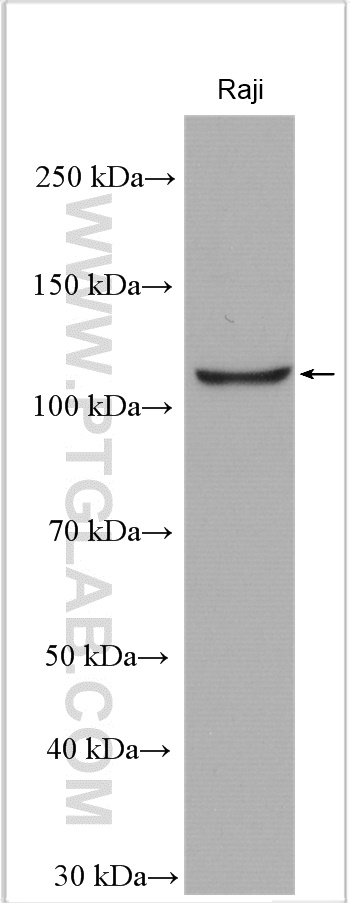验证数据展示
经过测试的应用
| Positive WB detected in | Raji cells |
推荐稀释比
| 应用 | 推荐稀释比 |
|---|---|
| Western Blot (WB) | WB : 1:500-1:3000 |
| It is recommended that this reagent should be titrated in each testing system to obtain optimal results. | |
| Sample-dependent, Check data in validation data gallery. | |
产品信息
28403-1-AP targets TAOK3 in WB, ELISA applications and shows reactivity with Human samples.
| 经测试应用 | WB, ELISA Application Description |
| 经测试反应性 | Human |
| 免疫原 | TAOK3 fusion protein Ag29158 种属同源性预测 |
| 宿主/亚型 | Rabbit / IgG |
| 抗体类别 | Polyclonal |
| 产品类型 | Antibody |
| 全称 | TAO kinase 3 |
| 别名 | DKFZp666H245, DPK, FLJ31808, hKFC A, JIK, JNK/SAPK inhibitory kinase, Jun kinase inhibitory kinase, KDS, Kinase from chicken homolog A, MAP3K18, TAO kinase 3, TAOK3 |
| 计算分子量 | 105 kDa |
| 观测分子量 | 100-105 kDa |
| GenBank蛋白编号 | BC002756 |
| 基因名称 | TAOK3 |
| Gene ID (NCBI) | 51347 |
| RRID | AB_2918158 |
| 偶联类型 | Unconjugated |
| 形式 | Liquid |
| 纯化方式 | Antigen affinity purification |
| UNIPROT ID | Q9H2K8 |
| 储存缓冲液 | PBS with 0.02% sodium azide and 50% glycerol , pH 7.3 |
| 储存条件 | Store at -20°C. Stable for one year after shipment. Aliquoting is unnecessary for -20oC storage. |
背景介绍
TAOK3 (Serine/threonine-protein kinase TAO3) is also named as DPK, JIK, KDS, MAP3K18. It belongs to the STE Ser/Thr protein kinase family. TAOK3 acts as an activator of the p38/MAPK14 stress-activated MAPK cascade. In response to DNA damage, it is involved in the G2/M transition DNA damage checkpoint by activating the p38/MAPK14 stress-activated MAPK cascade, probably by mediating phosphorylation of upstream MAP2K3 and MAP2K6 kinases. The protein can also be autophosphorylated (PMID:20949042).
实验方案
| Product Specific Protocols | |
|---|---|
| WB protocol for TAOK3 antibody 28403-1-AP | Download protocol |
| Standard Protocols | |
|---|---|
| Click here to view our Standard Protocols |
